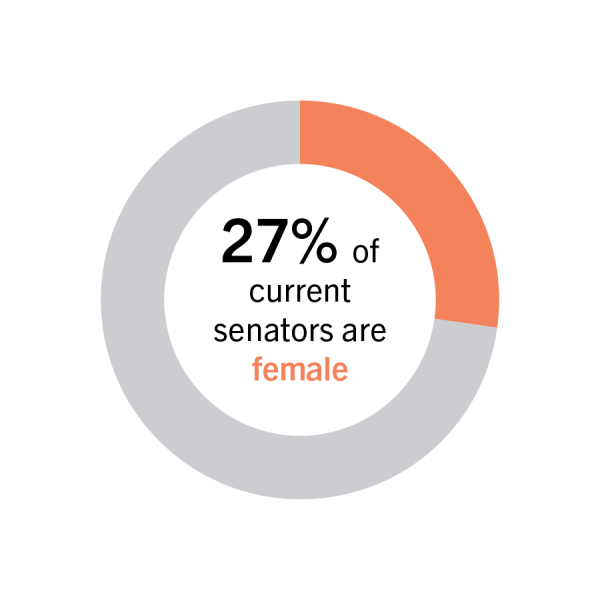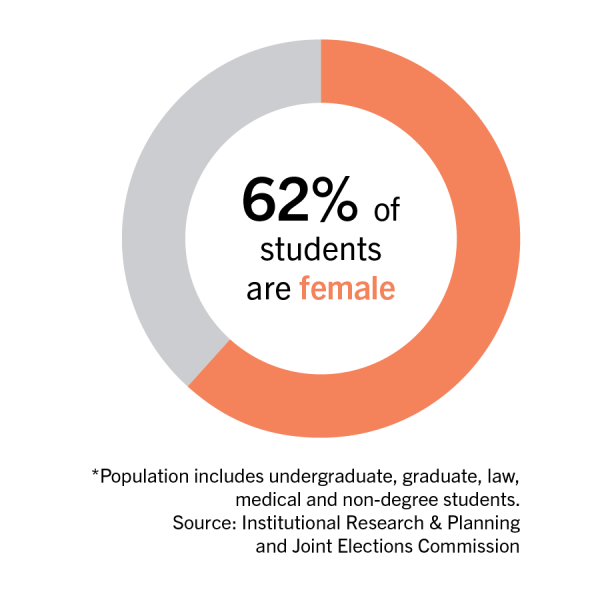At the end of this year’s term, less than a third of the senators in the Student Government Association were female.
Of the 25 students running for a senate seat in this year’s election, nine identify as women. In contrast, almost 62 percent of students at the University identify as female.
And in the SGA’s 115-year lifespan, the first woman was elected president just 25 years ago in 1998. Since then, nine presidents have been women.
Women in the SGA said the organization’s members and the public often doubt their leadership capabilities and question their authority — an experience that dissuades women from joining the body and pushes existing female leaders out.
“Being a queer woman in this position for an entire year, I have felt the full brunt of sexism, which has been extremely difficult,” SGA President Arielle Geismar said.
Geismar said she is questioned, interrupted and patronized on a “daily basis” by some of her male colleagues, who she said assume that they are the best person to speak on a matter, despite her position as the head of the institution.
“The amount of times I have felt belittled, or spoken over or patronized by men in the senate is embarrassing for them,” Geismar said.
She said the standard of excellence for people who aren’t men is “impossible” to achieve, which has trickled down to the SGA. Women in SGA leadership, she said, have to work twice as hard as men, and when factoring in other intersectional identities, the burden can triple or quadruple.
Geismar said the entire SGA must educate men who are patronizing toward female members of the governing body instead of siloing the responsibility to female members.
“It’s not the women who have been impacted by their behavior’s job to educate them,” she said.
A current SGA senator — who spoke on the condition of anonymity due to fear of retaliation from SGA members — said that as soon as she joined the senate and senators elected her to a position of power last May, she heard some of her male colleagues say that the only reason she had gotten the spot was because she was “sleeping with” the sponsor of the bill that created her position.
“There’s just a long history of women especially, being accused of sleeping their way up to the top,” the senator said. “So, hearing that and also being in a very long-term relationship that most people in the senate should know about, definitely stung a little.”
The senator said she reported the incidents to SGA leadership throughout the year who promised to speak with the perpetrators, but nothing has ever come from her conversations.
“All of these incidents have been reported to SGA leadership and to SGA advisers, and it’s just sort of wiped off,” the senator said. “I’m told that they’ll talk to whoever did it, however, there’s been no end to this occurring.”

Female SGA members from past administrations said SGA leadership rarely listened to them unless one of their male colleagues spoke for them.
Cordelia Scales — who served as a senator for two years and one of former SGA President Christian Zidoumba’s chief of staff — said when she joined the SGA in 2020, female SGA members told her to “never be in a room alone” with Howard Brookins III, a former SGA president who resigned in January 2021 amid allegations of sexual misconduct.
Scales said as a survivor of sexual assault, she was scared Brookins, an elected representative, would not keep her safe.
“I was scared — excuse my language — sh*tless,” Scales said. “I am a survivor of sexual assault, I have been since I was 7 years old. The fact that a person who was supposed to represent me would not keep me safe scared me.”
Kate Carpenter, who served in the SGA for two years as a senator and one year as vice president during the 2021-22 academic year, said “immediately” after she was elected vice president, she faced “gendered criticisms” from students. Carpenter said students posted on X criticizing her hair and her appearance in campaign photos.
She said she thinks the student body felt more comfortable criticizing her than her male counterparts because she was a woman, which led her to not run for president her senior year.
“All these lies started spiraling I think because people felt more comfortable making them up about me being a woman,” Carpenter said.
SGA Senate Pro Tempore Amy Cowley (ESIA-G), who has served as a senator for two terms, spearheaded the launch last summer of the gender equity resource group, one of the Community, Advocacy and Inclusion Committee’s four resource groups. She said she felt compelled to create the group because of a consistent lack of women in the senate and the lack of inclusivity for nonmen in the SGA.
She said the lack of gender inclusivity in the senate explains the rift between the predominantly female nature of the University and the overrepresentation of men in the senate.
“There’s a reason they’re not running,” Cowley said. “It speaks to the larger issue of we’re doing something wrong in the senate that is creating a less inclusive atmosphere for those voices.”
Cowley added that among senators, she has felt there is a lack of acknowledgment toward nonbinary individuals due to a lack of acknowledgment that gender is more than two binaries.
When she first created the gender equity resource group, members of the senate referred to the group as the “women’s resource group” for the first two months — which she said implied an inaccurate understanding of who gender equity applies to.
“That was not at all the point,” Cowley said. “It was not supposed to be just for women, it was supposed to be part of the inclusion committee.”
Former SGA Sen. Emmy Ly (GWSB-U) said she resigned from the senate in late December because she felt unwelcome as a woman. Moving forward, she said the SGA needs to implement private diversity training led by SGA faculty advisers to educate perpetrators on the harm caused by their microaggressions.
Ly said since perpetrators keep being “let off the hook,” there is no incentive for them to change their behavior.
“Have them self-reflect and do some introspection that will actually help them to realize what this detrimental behavior is and not just pull them aside for a superficial talk,” Ly said.
Liz Stoddard, a legislative assistant and one of three women running for a Columbian College of Arts & Sciences senate seat, said the SGA needs to work to diversify itself “from the bottom up.” She said the SGA must hire senate staff with different backgrounds and encourage all types of students to run.
She said a “toxic culture” has manifested in the SGA despite Geismar, a female president, helming the institution.
“We’ve seen diversification in the vice president and presidency, and that doesn’t seem to show much success,” Stoddard said. “We have a woman president, and it doesn’t seem to be going well.”
Stoddard said she doesn’t want to base hiring decisions solely on a candidate’s gender or identity, but the SGA will thrive when the organization is diverse. She said a governing body more representative of the University will allow every student to share their ideas while encouraging interaction and trust from students.
“That would lead to not just more people interacting and more people trusting the SGA, but I would say a more diverse slate of candidates.”












